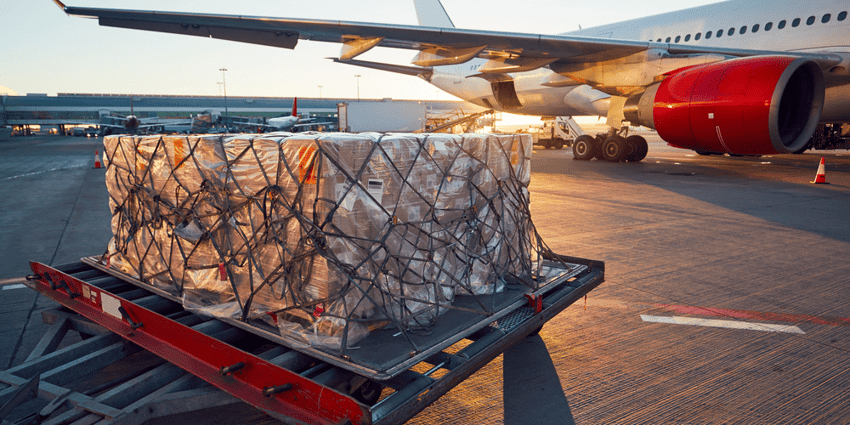Have you started thinking about importing goods to Australia for your business?
Whether you're looking to diversify your product range, find more cost-effective suppliers, or explore unique niche items exclusive to certain countries, delving into the world of imports can be exciting and daunting.
But navigating the process involves more than just negotiating shipping costs. You need to get your head around the tariffs, taxes, and Australia’s import requirements and regulations.
While government websites seem like a labyrinth of legal jargon, there’s no need to stress. We've curated all the vital information you need to understand the ins and outs of importing goods to Australia. We’ve even made this complex topic accessible to everyone, whether you're planning your first order or just need a quick refresher.
Let’s begin!
What Is Importing and What Does It Involve?
Importing is all about receiving items from overseas. You may wish to sell them or store them in a licensed customs warehouse. There are a few steps you should know before placing an order.
- Product Research: Identify the specific items you intend to import into Australia. This decision should be based on factors such as market demand, product availability and local pricing.
- Choose a Supplier: Once you've determined the products you want to import, the next step is to find a reputable supplier who can provide you with these goods at a competitive price.
- Obtain Import Permits and Licenses: Depending on the items you plan to import, you may need to apply for specific permits or licenses to bring them into Australia legally.
- Organise Transportation: Alongside securing a reliable supplier, you'll need to make logistical arrangements to transport the products to Australia. This involves selecting appropriate shipping methods and ensuring the safe delivery of your goods.
- Clear Customs: Importing goods into Australia requires compliance with Customs procedures and documentation requirements. Additionally, you should be prepared to pay duties and taxes on your imports.
Before you begin importing to Australia, it's crucial to familiarise yourself with the country's import laws and regulations. Failing to understand these critical terms and conditions can have severe consequences for you and your business.
Australian Import Laws and Regulations
As you would expect, there are some strict laws around importing goods to Australia. These are the regulations you need to educate yourself on.
Biosecurity Requirements
To protect the country, Australia enforces stringent biosecurity measures. Some products are prohibited from crossing the borders, and others require conditions to be met before arriving on our shores.
The Biosecurity Import Conditions system, BICON for short, is a valuable tool for anyone wanting to know how to start an import business in Australia. It makes it easy to check whether a product is:
- Permitted: Some items are allowed without any additional conditions.
- Subject to Import Conditions: Other goods are permissible under strict rules.
- Documentation Requirements: Certain products require specific supporting paperwork.
- Treatment Obligations: Additional handling may be required for some items.
- Import Permits: Documentation is mandatory for certain products.
As the importer, you are responsible for ensuring full compliance with the department's import conditions when bringing goods into Australia. Adhering to these regulations is essential for a smooth and legally compliant importing process.
Import Permits
Another benefit of BICON is that it will advise whether your products require an import permit. If it does, you’ll need to receive it before your items arrive in Australia. If it is not approved by then, the goods will be exported or disposed of at your expense.
You can apply for a standard permit if you meet all the import conditions. The benefit to you is that the application is faster, cheaper, and covers multiple goods in the same commodity class. Below are the conditions and items that generally get granted for a standard permit.
| Products for Human Use or Consumption | Products for Animal Use or Consumption | Products for Laboratory Use | Products for Other Use |
| Beef - Fresh (frozen/chilled) from Japan | Aquaculture feed and aquatic meals from New Zealand | Animal fluids and tissues (excl. viable reproductive tissues) | Bioremediation products containing approved ingredients only (retail packaged no greater than 10kg or 10L) |
| Butter and cheese from countries free of foot and mouth disease | Baits, attractants, lures and poisons | Antibodies | Bulk enzymes for environmental use |
| Collagen, including collagen casings | Bee pollen | Antigens | Cleaning agents, odour neutralisers and sanitisation products containing approved ingredients only (retail packaged no greater than 10kg or 10L) |
| Cooked pig (pork) meat | Bony fish (not restricted species) - Aquaculture, bait or pet food | Biological products | Fertiliser containing approved ingredients only (retail packaged no greater than 10kg or 10L) |
| Farmed finfish | Brine shrimp eggs for pet food use | Bulk enzymes | Highly processed tallow derivatives for all end uses (excluding stockfeed) |
| Food Samples | Food for aquatic animals enclosed in aquariums or ponds and containing aquatic animal ingredients | Cell lines and/or supernatant fluid | Prawn samples |
| Human therapeutics and medicines for use in clinical trials | Pet food containing biologically approved ingredients only | Culture media (no greater than 20ml or 20g animal-derived material) | Rawhide for return to Australia or temporary importation |
| Human therapeutics and medicines registered on the Australian Register of Therapeutic Goods | Pet fish food containing approved microalgae | Genetic material | Transhipped ship stores |
| Medical Devices on the Australian Register of Therapeutic Goods | Pet fish food - worms, krill, brine shrimp and mysis shrimp | Human fluids and tissues | Untanned hides and skins |
| Microalgae for human consumption and human therapeutic use | Pet food - Baked ears from New Zealand | Microorganisms (including viruses) | |
| Semi-synthetic, fermentation-derived active ingredients for veterinary and human therapeutic use | Pet food - Mealworms | Prepared media, including pre-poured plates, swabs and vials | |
| Uncooked pig (pork) meat | Pet food - Pig ears | Purified laboratory reagents, toxins and venoms | |
| Uncooked frozen whole, frozen partially peeled, or highly processed prawns | Semi-synthetic, fermentation-derived active ingredients for veterinary and human therapeutic use | Soil and water samples | |
| Veterinary and human therapeutics containing approved ingredients only | Veterinary and human therapeutics containing approved ingredients only | Test kits | |
| Vectors for laboratory use |
Information correct as of August 2023
If you don’t meet these conditions, you will need to apply for a non-standard permit. It requires a further assessment as to whether you can import your goods to Australia.
Tariffs, Taxes and Duties
Importing to Australia does come at a cost. The good news is that you won’t pay import tax in Australia for products under $1000. If your items are above this amount, then this is what you will be up for.
Goods and Services Tax (GST)
According to the GST Act, officially known as the A New Tax System (Goods and Services Tax) Act 1999, the importer's responsibility includes the payment of GST. This is to be paid in conjunction with the customs duty fee.
Additionally, the GST rate applied to taxable importations stands at 10% of the total value of the taxable importation. This value is comprised of:
- The customs value (CV) of the imported merchandise.
- Any applicable duty payments.
- The total expenses incurred or anticipated for transporting the goods to Australia and securing them during transportation (T&I).
- If applicable, any Wine Equalisation Tax (WET) payments.
Exemptions within the GST Act
- Money
- Certain food and beverages
- Certain National Disability Insurance Scheme plan supplies
- Certain medical aids and appliances
- Health goods
- Drugs and medicinal preparations
- Course materials
- Cars (for use by disabled veterans)
- Cars (for use by other disabled people)
- Precious metals
- Certain Customs duty concessions
- Certain containers
- Returned Australian goods
- GST Exemptions provided by the Consular Privileges and Immunities Act 1972
- GST Exemptions provided by the Diplomatic Privileges and Immunities Act 1967
- GST Exemptions provided by the International Organisations (Privileges and Immunities) Act 1967
- Medical service providers
Customs Duty
The customs duty payable for imports into Australia varies based on multiple aspects, including the type of products, their country of origin, and their final value. While the rate can differ depending on the category of goods imported, some items may have higher duty rates than others. Typically, most cargo has a standard customs duty of 5%.
Free Trade Agreements
- Australia-New Zealand (ANZCERTA or CER)
- Singapore-Australia (SAFTA)
- Australia-United States (AUSFTA)
- Thailand-Australia (TAFTA)
- Australia-Chile (ACl-FTA)
- ASEAN-Australia-New Zealand (AANZFTA)
- Malaysia-Australia (MAFTA)
- Korea-Australia (KAFTA)
- Japan-Australia (JAEPA)
- China-Australia (ChAFTA)
- Comprehensive and Progressive Agreement for Trans-Pacific Partnership (CPTPP)
- Australia-Hong Kong (A-HKFTA) and associated Investment Agreement (IA)
- Peru-Australia (PAFTA)
- Indonesia-Australia Comprehensive Economic Partnership Agreement (IA-CEPA)
- Pacific Agreement on Closer Economic Relations (PACER) Plus
- Regional Comprehensive Economic Partnership Agreement (RCEP)
- Australia-India Economic Cooperation and Trade Agreement (ECTA)
- Australia-United Kingdom Free Trade Agreement (A-UKFTA)
Import Processing Charges
The Australian Border Force imposes Import Processing Charges the moment an imported goods declaration is made.
- For non-warehoused imported products, charges are:
- $50 for consignment values between $1,000 and $10,000.
- $152 for consignment values above $10,000.
- For warehoused goods:
- $23 when submitted electronically.
- $63 when submitted physically.
Goods imported under Status of Forces Agreements are exempt from paying Import Processing Charges.
What You Can and Can’t Import to Australia
The list of items you can import to Australia is thankfully a lot longer than the products that are restricted or prohibited. If your goods don’t fall into the categories below, you can use BICON to confirm if they are permitted and if an import license is required.
Prohibited Items as of August 2023
- Cat and dog fur products
- Counterfeit credit cards
- Cultural heritage goods
- Rough diamonds
- Endangered animal and plant species
- Firearms and firearm parts, accessories and ammunition
- Hazardous waste
- Ozone-depleting substances/synthetic greenhouse gases
- Pesticides and other hazardous chemicals
- Pornography and objectionable material
- Radioactive substances
- Security-sensitive ammonium nitrate
- Suicide devices
- Viable material derived from human embryo clones
- Toothfish
- Anabolic or androgenic substances
- Asbestos
- Glazed ceramic ware
- Chemical weapons
- Tobacco
- Lighters
- Cosmetics featuring toxic materials
- Pepper and OC spray
- Dog collars with protrusions
- Dangerous dog breeds
- Drugs and narcotics
- Erasers and novelty items featuring toxic materials
- Plastic explosives
- Fish
- Electronic fly swatters and mosquito bats
- Growth hormones and substances of human or animal origin
- Ice pipes
- Imitation firearms
- Incandescent lamps
- Kava
- Knives and daggers
- Laser pointers
- Money boxes and novelty items featuring toxic materials
- Psychoactive substances and serious drug alternatives
- Paintball markers
- Pencils and paintbrushes featuring toxic materials
- Polychlorinated biphenyls, terphenyls and polyphenols
- Signal jamming devices
- Soft air firearms
- Tablet presses and encapsulators
- Therapeutic drugs, substances and goods
- Toys featuring toxic materials
- Woolpacks
- Body armour
- Good featuring Commonwealth and Australian symbolism
- Trip alarms featuring explosive ammunition
- Electromagnetic weapons
- Extendable batons
- Karambits
- Mercury
What You Need to Import Goods Into Australia
You don’t need to learn how to get an import license in Australia. That’s because there is no requirement for individuals or companies to hold one. However, other essential items are needed before you begin receiving items from overseas.
- Australian Business Number (ABN): Ensure you have an ABN ready for your import activities. Being registered for Goods and Services Tax (GST) is also crucial. This registration allows you to claim input tax credits and access the GST deferral scheme. You can then pay GST on taxable imports via your BAS statement instead of to the Australian Border Force.
- Relevant Permits: Utilise BICON to determine whether your imported goods require specific permits.
- Customs Documentation: Accurate customs documentation is vital. Ensure all your information is correct and contains all the relevant details required for a smooth import process.
- Duties and Taxes: Pay the fees associated with your imported goods.
- Biosecurity Requirements: Before importing, assess the biosecurity requirements to confirm the safety of bringing your items into Australia.
What is Customs?
The Australian Border Force regulates the movement of goods entering the country. However, they also rely on importers to perform self-assessments regarding the accuracy of their transactions.
That’s why it’s vital to note that importers hold legal responsibility for the accuracy of the information provided to the ABF, regardless of who prepares the documentation. This obligation extends to cargo reporters, customs brokers, freight forwarders, warehouse owners, financial institutions, information storage facilities, bureau services, stevedores and more.
Importers are also required to verify the product's country of origin. Non-compliance with customs legislation can lead to penalties.
It’s vital that all imported goods are correctly documented, accurately classified, and that any excess goods are promptly reported. This can include unordered items, samples, and promotional merchandise. You should also hold on to your commercial documents for at least five years from the entry date.
The Customs Clearance Process
Due to the sheer size of parcels coming in and out of the country, the customs clearance process is fortunately relatively seamless. There are three steps involved:
- The first stop for imported items is the Customs office.
- The Australian Border Force confirms the goods are reported and declared directly via the commercial invoice, bill of lading, and packing list. They also check permits are produced, and all duties and taxes are paid.
- The Australian Border Force provides an Authority to Deal that permits importers to sell their goods in the country.
How to Avoid Common Mistakes During the Customs Clearance Process
Use these tips to ensure the shipping and customs clearance process is completed on time.
| Common Mistakes | How to Avoid |
| Incorrect Documentation |
Ensure you have all the appropriate paperwork and that it is filled correctly. You need:
|
| Not Declaring All Goods | Even if your products are not subject to duties or tariffs, you must declare them when importing goods to Australia. You must also include anything you weren’t expecting, such as excess items, promotional materials, and free samples. |
| Underestimating the Value of Products | You must provide accurate values for the items you’re importing to Australia. These figures determine how much you’ll pay for duties and taxes. |
| Non-compliance With Biosecurity Rules | Before your products arrive in Australia, use BICON to confirm they are suitable for delivery in this country. |
| Not Paying Correct Duties and Taxes | Confirm the duties and taxes before your items arrive and finalize payment to ensure a smooth customs clearance process. |
| Wrong Parcel Dimensions | Incorrect parcel measurements and weights can cause delays. Confirm all package information with the supplier to avoid waiting longer than you need to for your products. |
How Interparcel Helps With Importing Goods to Australia
It might seem like there is a lot to remember when importing goods to Australia. From the biosecurity requirements to the paperwork to the duties and taxes. But you need to ensure all your information is accurate and up to date for the smoothest process possible.
The good news is that you don’t have to do it all alone.
Interparcel can not only guide you through the process with expert assistance, but we can often have cheaper shipping alternatives when using air freight services. This is typically the service used when searching for samples from manufacturers.
Simply follow the steps below to determine if Interparcel can get you better air freight rates:
- Determine the rate for your sample with and without shipping expenses.
- Request the pickup address from your manufacturer for using your own courier.
- Add the pickup address + destination into the Interparcel shipping calculator.
- Include the weight and dimensions of the final package on the shipping calculator.
- Search through the list of provided couriers to find a courier that satisfies your specific shipping needs.
- If you find the courier you want, simply select them and fill out the provided form.
If you need any help with finding couriers for samples or just a general shipping strategy - our team of shipping experts help you every step of the way.
Getting started is easy! Sign up for a free account or book a call, and one of our shipping experts will get in touch!










 Facebook
Facebook Twitter
Twitter Instagram
Instagram Linked In
Linked In YouTube
YouTube